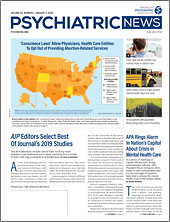Encouraged by student advocates, some states have passed legislation allowing students to take so-called “mental health days” from school.
In 2018, Utah changed the definition of excused absences from school to include mental illness. Oregon did the same last year, allowing up to five excused absences in a three-month period for “the mental or behavioral health of the pupil.” Other states, including Florida, are considering similar options.
Those rallying behind the initiative say it will allow students to talk more openly about mental health issues so they can be honest about why they need a break from school. “Being open to adults about our mental health promotes positive dialogue that could help kids get the help they need,” Hailey Hardcastle, an 18-year-old advocate in Oregon, told the Associated Press.
“This is parity,” said Oscar Bukstein, M.D., M.P.H., a psychiatrist at Boston Children’s Hospital and a member of APA’s Council on Children, Adolescents, and Their Families. “We do it for physical illnesses. Why not do it for mental illnesses?”
James MacKenzie, D.O., a child and adolescent psychiatrist in Chicago and past president of the Illinois Psychiatric Society, agreed, though he cautioned that the label “mental health day” could have unintended consequences.
“Kids with asthma don’t need an ‘asthma health day,’ and kids with diabetes don’t need a ‘diabetes health day,’ ” MacKenzie pointed out. Students dealing with depression, anxiety, or another psychiatric illness should be able to take the time they need from school simply under the umbrella of a “sick day,” he said.
Specifically calling the absences “mental health days” may worsen stigma, MacKenzie said, which is the opposite of advocates’ stated intentions. Several students who testified before the Oregon state legislature in February 2019 told legislators that the law would reinforce the idea that mental illness is no different from other medical illnesses.
Roxanne and Jason Wilson said the Oregon law may have helped save the life of their 14-year-old daughter Chloe, who died by suicide in 2018, the AP reported. Chloe pretended to be sick to stay at home when she was dealing with bullying at school. “Because she lied to get her absences excused, we didn’t get to have those mental health conversations that could have saved her life,” Roxanne Wilson told the AP.
In 2017, 31% of high school students reported feeling sad or hopeless almost every day for two or more weeks, according to the Department of Health and Human Services. Thirteen percent of adolescents (aged 12 to 17) reported having at least one major depressive episode during the 12 months before the survey.
According to the Centers for Disease Control and Prevention, suicide rates for people aged 10 to 24 increased 56% between 2007 and 2017.
When it comes to taking off school days for mental health reasons, Bukstein pointed out that the safeguards that exist around other medical illnesses—such as requiring a doctor’s note for extended absences and otherwise limiting the number of days students can take off—will, and should, still apply to absences due to mental health. Students shouldn’t take too many days off without consulting with a physician. Absences due to mental health should be treated just the same as those due to physical health, he said. ■
The Oregon legislation is posted
here, and the Utah legislation is posted
here.

